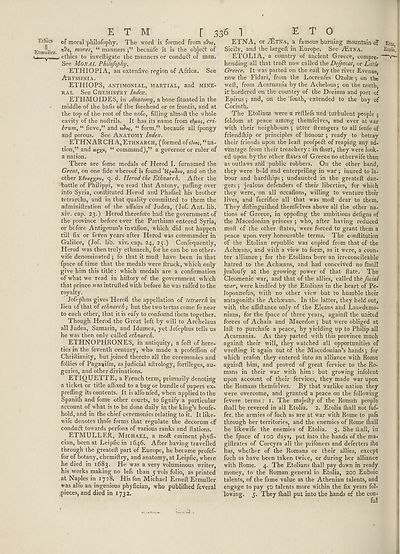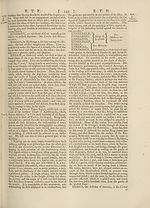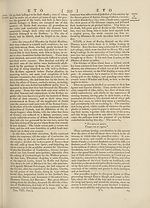Encyclopaedia Britannica, or, a Dictionary of arts, sciences, and miscellaneous literature : enlarged and improved. Illustrated with nearly six hundred engravings > Volume 8, ELE-FOR
(364) Page 336
Download files
Complete book:
Individual page:
Thumbnail gallery: Grid view | List view

E T M r 336 1 E T 0
Ethics
II
Etmuiler.
of moral 'pliilofophy. The word is formed from
mores, “ manners $” becaufe it is the objeft of
, ethics to inveftigate the manners or conduft of man.
See Moral PhilofopJuj.
ETHIOPIA, an extenlive region of Africa. See
Abyssinia.
ETHIOPS, ANTIMONIAL, MARTIAL, and MINE¬
RAL See Chemistry Index.
ETHMOIDES, in Anatomy, a bone fituated in the
middle-of the balls of the forehead or os frontis, and at
the top of the root of the nofe, filling almoft the whole
cavity of the noftrils. It has its name from efyts;, cri-
brum, “ fieve,” and “ form,” becaufe all fpongy
and porous. See Anatomy Index.
ETHNARCHA, Ethnarch, (formed of“na¬
tion,” and wgxs, “ command),” a governor or ruler of
a nation.
There are fome medals of Herod I. furnamed the
Great, on one fide whereof is found eH^ov, and on the
other E6»x£x,6v, q. d. Herod the Ethnarch. After the
battle of Philippi, we read that Antony, palling over
into Syria, conftituted Herod and Phafael his brother
tetrarchs, and in that quality committed to them the
adminiftration of the affairs of Judea, (Jof. Ant. lib.
xiv. cap. 23.) Herod therefore had the government of
the province before ever the Parthians entered Syria,
or before Antigonus’s invafion, which did not happen
till fix or feven years after Herod was commander in
Galilee, (Jof. lib. xiv. cap. 24, 25.) Confequently,
Herod was then truly ethnarch, for he can be no other-
wife denominated ; lb that it muft have been in that
fpace of time that the medals were ftruck, which only
give him this title : which medals are a confirmation
of what we read in hiftory of the government which
that prince w as intrufted w ith before he w as raifed to the
royalty.
Jofephus gives Herod the appellation of tetrarch in
lieu of that of ethnarch; but the two terms come fo near
to each other, that it is eafy to confound them together.
Though Herod the Great left by will to Archelaus
all Judea, Samaria, and Idumea, yet Jofephus tells us
he was then only called ethnarch.
ETHNOPHRONES, in antiquityj a fe£I of here¬
tics in the feventh century, who made a profeflion of
Chriftianity, but joined thereto all the ceremonies and
follies of Pagaijifm, as judicial aftrology, fortileges, au¬
guries, and other divinations.
ETIQUETTE, a French term, primarily denoting
A ticket or title affixed to a bag or bundle of papers ex-
preffing its contents. It is alfo ufed, when applied to the
Spanilh and fome other courts, to fignify a particular
account of what is to be done daily in the king’s houfe-
hold, and in the chief ceremonies relating to it. It like-
wife denotes thofe forms that regulate the decorum of
conduct towards perfons of various ranks and Rations.
ETMULLER, Michael, a moft eminent phyfi-
cian, born at Leipfic in 1646. After having travelled
through the greateft part of Europe, he became profef-
for of botany, chemiftry, and anatomy, at Leipfic, w here
he died in 1683. He was a very voluminous writer,
his works making no lefs than 5 vols folio, as printed
at Naples in 1728. His fon Michael Erneft Etmuller
was alfo an ingenious phyfician, who publiflied feveral
pieces, and died in 1732.
ETNA, or ^Etna, a famous burning mountain of
Sicily, and the largeft in Europe^ See Aitna.
ETOLIA, a country of ancient Greece, compre¬
hending all that traft now called the Defpotat, or Little
Greece. It was parted on the eaft by the river Events,
now the Fidari, from the Locrenfes Ozolee4 on the
weft, from Acarnania by the Aehelous j on the north,
it; bordered on the country of the Dorians and part of
Epirus j and, on the fouth, extended to the bay of
Corinth.
The Etolians wrere a reftlefs and turbulent people j
feldom at peace among themfelves, and ever at war
with their neighbours ; utter ftrangers to all fenfe of
friendffiip or principles of honour j ready to betray
their friends upon the leaft profpeft of reaping any ad¬
vantage from their treachery : ih {hurt, they were look¬
ed upon by the other Rates of Greece no otherwife than
as outlaws and public robbers. On the other hand,
they were bold and enterprifing in war j inured to la¬
bour and hardftiips; undaunted in the greateft dan¬
gers j jealous defenders of their liberties, for which
they were, on all occaftons, willing to venture their
lives, and facrifice all that was moft dear to them.
They diftinguiffied themfelves above all the other na¬
tions ©f Greece, in oppofing the ambitious defigns of
the Macedonian princes ; who, after having reduced
moft of the other ftates, were forced to grant them a
peace upon very honourable terms* The conftitution
of the Etolian republic W’as copied from that of the
AchaeaUs, and with a view to form, as it were, a coun¬
ter alliance ; for the Etolians bore an irreconcileable
hatred to the Achaeans, and had conceived no fmall
jealoufy at the growing power of that ftate. The
Cleomenic war, and that of the allies, called the facial
war, were kindled by the Etolians in the heart of Pe-
loponnefus, with no other view1 but to humble their
antagonifts the Achseans. In the latter, they held out,
with the affiftance only of the Eleans and Lacedemo¬
nians, for the fpace of three years, againft the united
forces of Achaia and Macedon ; but were obliged at
laft to purchafe a peace, by yielding up to Philip all
Acarnania. As they parted w ith this province much
againft their will, they watched all opportunities of
wrefting it again out of the Macedonian’s hands; for
which reafoh they entered into an alliance with Rome
againft; him, and proved of great fervice to the Ro¬
mans in their war with him: but grow ing infolent
upon account of their fervices, they made war upon
the Romans themfelves. By that warlike nation they
were overcome, and granted a peace on the following
feVere terms: I. The majefty of the Romah people
{hall be revered in all Etolia. 2. Etolia ftiall not buf¬
fer the armies of fuch as are at war with Rome to pafs
through her territories, and the enemies of Rome ffiall
be likewife the enemies of Etolia. 3. She lLall, in
the fpace of 10O days, put into the hands of the ma-
giftrates of Corcyra all the prifoners and deferters {he
has, whether of the Romans or their allies, except
fuch as have been taken twice, or during her alliance
with Rome. 4. The Etolians ftiall pay down in ready
money, to the Roman general in Etolia, 200 Euboic
talents, of the fame value as the Athenian talents, and
engage to pay 50 talents more within the fix years fol¬
lowing. 5. They ftiall put into the hands of the con-
Ethics
II
Etmuiler.
of moral 'pliilofophy. The word is formed from
mores, “ manners $” becaufe it is the objeft of
, ethics to inveftigate the manners or conduft of man.
See Moral PhilofopJuj.
ETHIOPIA, an extenlive region of Africa. See
Abyssinia.
ETHIOPS, ANTIMONIAL, MARTIAL, and MINE¬
RAL See Chemistry Index.
ETHMOIDES, in Anatomy, a bone fituated in the
middle-of the balls of the forehead or os frontis, and at
the top of the root of the nofe, filling almoft the whole
cavity of the noftrils. It has its name from efyts;, cri-
brum, “ fieve,” and “ form,” becaufe all fpongy
and porous. See Anatomy Index.
ETHNARCHA, Ethnarch, (formed of“na¬
tion,” and wgxs, “ command),” a governor or ruler of
a nation.
There are fome medals of Herod I. furnamed the
Great, on one fide whereof is found eH^ov, and on the
other E6»x£x,6v, q. d. Herod the Ethnarch. After the
battle of Philippi, we read that Antony, palling over
into Syria, conftituted Herod and Phafael his brother
tetrarchs, and in that quality committed to them the
adminiftration of the affairs of Judea, (Jof. Ant. lib.
xiv. cap. 23.) Herod therefore had the government of
the province before ever the Parthians entered Syria,
or before Antigonus’s invafion, which did not happen
till fix or feven years after Herod was commander in
Galilee, (Jof. lib. xiv. cap. 24, 25.) Confequently,
Herod was then truly ethnarch, for he can be no other-
wife denominated ; lb that it muft have been in that
fpace of time that the medals were ftruck, which only
give him this title : which medals are a confirmation
of what we read in hiftory of the government which
that prince w as intrufted w ith before he w as raifed to the
royalty.
Jofephus gives Herod the appellation of tetrarch in
lieu of that of ethnarch; but the two terms come fo near
to each other, that it is eafy to confound them together.
Though Herod the Great left by will to Archelaus
all Judea, Samaria, and Idumea, yet Jofephus tells us
he was then only called ethnarch.
ETHNOPHRONES, in antiquityj a fe£I of here¬
tics in the feventh century, who made a profeflion of
Chriftianity, but joined thereto all the ceremonies and
follies of Pagaijifm, as judicial aftrology, fortileges, au¬
guries, and other divinations.
ETIQUETTE, a French term, primarily denoting
A ticket or title affixed to a bag or bundle of papers ex-
preffing its contents. It is alfo ufed, when applied to the
Spanilh and fome other courts, to fignify a particular
account of what is to be done daily in the king’s houfe-
hold, and in the chief ceremonies relating to it. It like-
wife denotes thofe forms that regulate the decorum of
conduct towards perfons of various ranks and Rations.
ETMULLER, Michael, a moft eminent phyfi-
cian, born at Leipfic in 1646. After having travelled
through the greateft part of Europe, he became profef-
for of botany, chemiftry, and anatomy, at Leipfic, w here
he died in 1683. He was a very voluminous writer,
his works making no lefs than 5 vols folio, as printed
at Naples in 1728. His fon Michael Erneft Etmuller
was alfo an ingenious phyfician, who publiflied feveral
pieces, and died in 1732.
ETNA, or ^Etna, a famous burning mountain of
Sicily, and the largeft in Europe^ See Aitna.
ETOLIA, a country of ancient Greece, compre¬
hending all that traft now called the Defpotat, or Little
Greece. It was parted on the eaft by the river Events,
now the Fidari, from the Locrenfes Ozolee4 on the
weft, from Acarnania by the Aehelous j on the north,
it; bordered on the country of the Dorians and part of
Epirus j and, on the fouth, extended to the bay of
Corinth.
The Etolians wrere a reftlefs and turbulent people j
feldom at peace among themfelves, and ever at war
with their neighbours ; utter ftrangers to all fenfe of
friendffiip or principles of honour j ready to betray
their friends upon the leaft profpeft of reaping any ad¬
vantage from their treachery : ih {hurt, they were look¬
ed upon by the other Rates of Greece no otherwife than
as outlaws and public robbers. On the other hand,
they were bold and enterprifing in war j inured to la¬
bour and hardftiips; undaunted in the greateft dan¬
gers j jealous defenders of their liberties, for which
they were, on all occaftons, willing to venture their
lives, and facrifice all that was moft dear to them.
They diftinguiffied themfelves above all the other na¬
tions ©f Greece, in oppofing the ambitious defigns of
the Macedonian princes ; who, after having reduced
moft of the other ftates, were forced to grant them a
peace upon very honourable terms* The conftitution
of the Etolian republic W’as copied from that of the
AchaeaUs, and with a view to form, as it were, a coun¬
ter alliance ; for the Etolians bore an irreconcileable
hatred to the Achaeans, and had conceived no fmall
jealoufy at the growing power of that ftate. The
Cleomenic war, and that of the allies, called the facial
war, were kindled by the Etolians in the heart of Pe-
loponnefus, with no other view1 but to humble their
antagonifts the Achseans. In the latter, they held out,
with the affiftance only of the Eleans and Lacedemo¬
nians, for the fpace of three years, againft the united
forces of Achaia and Macedon ; but were obliged at
laft to purchafe a peace, by yielding up to Philip all
Acarnania. As they parted w ith this province much
againft their will, they watched all opportunities of
wrefting it again out of the Macedonian’s hands; for
which reafoh they entered into an alliance with Rome
againft; him, and proved of great fervice to the Ro¬
mans in their war with him: but grow ing infolent
upon account of their fervices, they made war upon
the Romans themfelves. By that warlike nation they
were overcome, and granted a peace on the following
feVere terms: I. The majefty of the Romah people
{hall be revered in all Etolia. 2. Etolia ftiall not buf¬
fer the armies of fuch as are at war with Rome to pafs
through her territories, and the enemies of Rome ffiall
be likewife the enemies of Etolia. 3. She lLall, in
the fpace of 10O days, put into the hands of the ma-
giftrates of Corcyra all the prifoners and deferters {he
has, whether of the Romans or their allies, except
fuch as have been taken twice, or during her alliance
with Rome. 4. The Etolians ftiall pay down in ready
money, to the Roman general in Etolia, 200 Euboic
talents, of the fame value as the Athenian talents, and
engage to pay 50 talents more within the fix years fol¬
lowing. 5. They ftiall put into the hands of the con-
Set display mode to:
![]() Universal Viewer |
Universal Viewer | ![]() Mirador |
Large image | Transcription
Mirador |
Large image | Transcription
Images and transcriptions on this page, including medium image downloads, may be used under the Creative Commons Attribution 4.0 International Licence unless otherwise stated. ![]()
| Permanent URL | https://digital.nls.uk/192268151 |
|---|
| Attribution and copyright: |
|
|---|
| Description | Ten editions of 'Encyclopaedia Britannica', issued from 1768-1903, in 231 volumes. Originally issued in 100 weekly parts (3 volumes) between 1768 and 1771 by publishers: Colin Macfarquhar and Andrew Bell (Edinburgh); editor: William Smellie: engraver: Andrew Bell. Expanded editions in the 19th century featured more volumes and contributions from leading experts in their fields. Managed and published in Edinburgh up to the 9th edition (25 volumes, from 1875-1889); the 10th edition (1902-1903) re-issued the 9th edition, with 11 supplementary volumes. |
|---|---|
| Additional NLS resources: |
|

